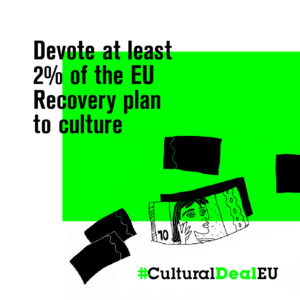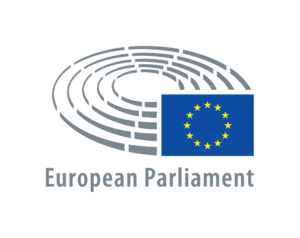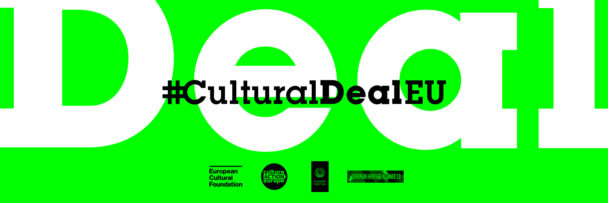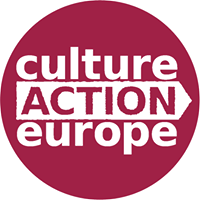 The #CulturalDealEU campaign calls heads of states and governments of the EU Member States to devote at least 2% of their National Resilience and Recovery Plans (NRRPs) to culture and show due evidence for cultural and European relevance.
The #CulturalDealEU campaign calls heads of states and governments of the EU Member States to devote at least 2% of their National Resilience and Recovery Plans (NRRPs) to culture and show due evidence for cultural and European relevance.
#CulturalDealEU is jointly developed by Culture Action Europe, European Cultural Foundation, and Europa Nostra (representing the European Cultural Alliance). By bundling together both short and long term objectives, a joint statement envisions as a roadmap towards a more balanced, more comprehensive, and more inclusive European development model.
Support the #CulturalDealEU now by endorsing it!

 The second edition is the updated version of the guide first produced in 2015 within the scope of the EU funded project, Green Art Lab Alliance (
The second edition is the updated version of the guide first produced in 2015 within the scope of the EU funded project, Green Art Lab Alliance ( The EP Culture Committe has published a study by IDEA Consult, Goethe-Institut, Inforelais and Values of Culture&Creativity on Covid19 crisis effects on the cultural and creative sectors (CCS) as well as the policy responses that are formulated to support the sectors. The already fragile organisational structures and working practices are hit by a chain of effects, severely impacting the economic and social situation in the CCS, especially the venue- and visitor-based sub-sectors such as the performing arts and heritage. Since policy support focuses on emergency measures, not (yet) on relaunch and innovation the study proposes three flagship measures: 1) Fair working system, 2) European digital culture frameworks and 3) taking CCS as integral part of innovative and cohesive societies.
The EP Culture Committe has published a study by IDEA Consult, Goethe-Institut, Inforelais and Values of Culture&Creativity on Covid19 crisis effects on the cultural and creative sectors (CCS) as well as the policy responses that are formulated to support the sectors. The already fragile organisational structures and working practices are hit by a chain of effects, severely impacting the economic and social situation in the CCS, especially the venue- and visitor-based sub-sectors such as the performing arts and heritage. Since policy support focuses on emergency measures, not (yet) on relaunch and innovation the study proposes three flagship measures: 1) Fair working system, 2) European digital culture frameworks and 3) taking CCS as integral part of innovative and cohesive societies.
 The European Commission launched a public consultation on the development of a European Democracy Action Plan (EDAP). On September 14th Culture Action Europe and many other European networks and institutions welcomed the initiative and called the Commission in an open letter to reflect in it especially the status of the freedom of artistic expression as a fundamental aspect of cultural rights. The letter submits the following recommendations to the Commission:
The European Commission launched a public consultation on the development of a European Democracy Action Plan (EDAP). On September 14th Culture Action Europe and many other European networks and institutions welcomed the initiative and called the Commission in an open letter to reflect in it especially the status of the freedom of artistic expression as a fundamental aspect of cultural rights. The letter submits the following recommendations to the Commission: